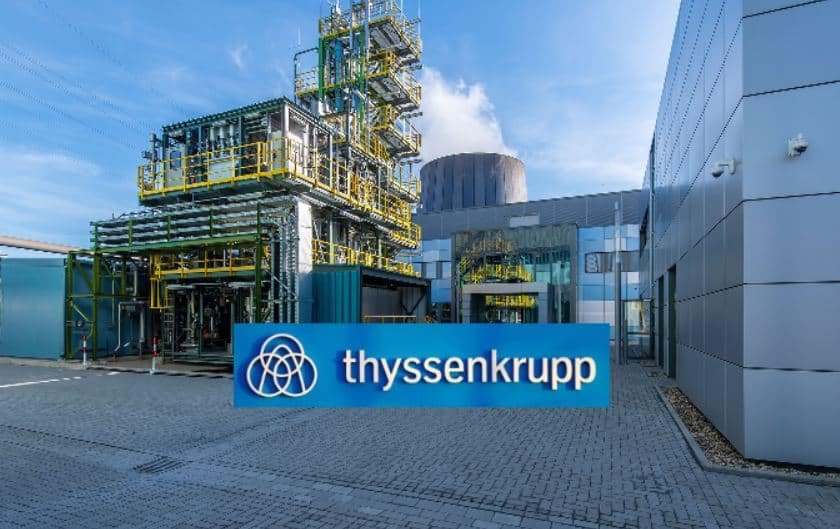Thyssenkrupp AG got the European Union’s approval for a 2 billion euros, or about $2.3 billion, package of state subsidies from the German government for its proposed green steel production.
Currently, Thyssenkrupp Steel division is responsible for 2.5% of Germany’s total carbon emissions. The leading German metals, engineering, and manufacturing company aims to reduce such footprint by producing climate-friendly steel at their Duisburg site.
Green Deal is Green Steel
Big businesses across Europe are turning to governments for large subsidies to construct green production facilities. This is in line with the EU’s “Green Deal” that seeks to take a lead in the clean technology sector.
The bloc hopes to keep pace with the massive aid by other countries to companies to make their businesses green. And green steel is a key driver of a Net Zero industry in the region.
The steel industry is raking in hundreds of billions of dollars in revenue annually but at the cost of the planet. The industry accounts for up to 9% of global carbon emissions due to its high reliance on coal to make steel.
The industry is, in fact, the largest emitting manufacturing sector. Cutting its huge footprint is very expensive but using clean technology to make green steel can help lower the cost.
Green steel production usually involves hydrogen to purify iron ore pellets and melts it to make steel in electric furnaces. This clean technology basically replaces coal used in powering blast furnaces that releases over one ton of CO2 for every ton of steel.
ThyssenKrupp Steel has tested the viability of this green steel technology as part of its climate strategy. The German industrial company’s goal is to make steel production carbon-neutral by 2045.
The firm aims to reduce carbon emissions of steel production across three sources – Scope 1, 2, and 3 – by at least 90% by 2050. In the short term, Thyssenkrupp Steel plans to cut Scope 1 and 2 emissions by 30% by 2030 versus 2018 levels.
Hydrogen for Green Steel Production
A big part of achieving those goals is the construction of a hydrogen-powered direct reduction (DR) plant at Thyssenkrupp’s Duisburg site. It’s a revolutionary concept with a capacity of 2.5 million metric tons of directly reduced iron (DRI). The company calls it “tkH2Steel”, which can reduce over 3.5 million metric tons of CO2.
Contrary to conventional blast furnaces, DR plants don’t produce hot metal but solid sponge iron, aka “direct reduced iron”. DRI needs further melting to make high-quality steel.
Thyssenkrupp Steel has been working on this technology to produce green steel. In March this year, the company awarded a contract worth billions of euros to SMS group, a company from North Rhine-Westphalia, for a direct reduction plant. The project marks one of the world’s largest industrial decarbonization initiatives in the industry.
The project is a groundbreaking initiative for Germany’s largest steelmaker – replacing carbon-intensive steel production with clean technology using hydrogen. The company can continue to boil steel like in the past using proven processes but use hydrogen instead of coal.
To date, the company’s Duisburg production site emits about 20 million metric tons of CO2 a year with its coal-based hot iron production using blast furnaces. With hydrogen-powered direct reduction plants, Thyssenkrupp Steel can significantly slash its emissions and produce carbon-neutral steel. The giant steelmaker plans to avoid as much as 6 million metric tons of CO2 by 2030.
The 2 billion euros subsidy approved by the EU will help Thyssenkrupp achieve its green steel production targets.
Funding Steel Decarbonization in Europe
The subsidy package is a combination of direct grants and a conditional payment to support the steelmaker’s decarbonization plan and ramp up its hydrogen uptake.
The EU and Germany have agreed to give Thyssenkrupp financial aid in June. The funding includes around 1.3 billion euros from the federal government and 700 euros from North Rhine-Westphalia’s state government.
The bloc also approved a separate 850 million euros subsidy in France to help fund ArcelorMittal SA‘s steel decarbonization plans.
In Sweden, a green steel startup secured 190 million euros from private investors to start building its green hydrogen-powered steel plant in Boden.
The target date of Thyssenkrupp’s green steel production at its hydrogen-powered DRI plant is the end of 2026. This groundbreaking project winning over European government support shows a business case for the Green Deal’s investment in clean technology.

